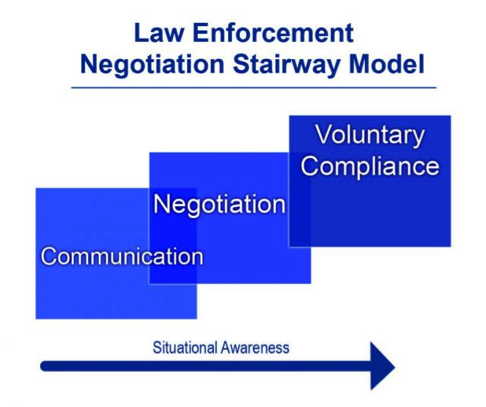Stress
The Effective Crisis Negotiator: Prepare Like a Navy SEAL
Learn how you can use the same skills.
Posted March 19, 2017
Author's note: This article was originally intended for law enforcement hostage negotiators, but I believe PsychologyToday.com readers will find these skills and tips applicable to your professional and personal lives as well.
Crisis and hostage negotiators, as well as other law enforcement personnel, continually find themselves involved in crisis situations where the pressure is placed on him or her to peacefully resolve an incident. These situations are known to be stressful and this pressure has only increased with recent terrorist-related incidents involving hostages being taken and the attacks being prolonged when the suspect becomes barricaded which requires the use of negotiators. To be successful in these stressful environments, it is important for negotiators to continually train and practice in order to handle the stress and be properly able to use the requisite skills effectively.
Looking beyond the realm of crisis negotiation, hostage negotiators can learn from the skills practiced in other areas of crisis and adapt it to their trade in order to remain ready for the next call to a crisis job. United States Navy SEALs are elite soldiers and among the most highly trained military personnel in the world. Although their work in crisis is much different, there is still much that crisis negotiators can learn by examining what makes them effective.
The strategies discussed in this article have helped Navy SEALs prepare for their grueling training exercises including having their breathing apparatus removed while underwater as well as during real crisis incidents. Four strategies Navy SEALs use are: 1) goal setting, 2) mental rehearsal, 3) self-talk motivation, and 4) emotional control. Each are further explained below and are adapted for crisis negotiators. The last step discusses breathing exercises. Some readers might easily be dismissive of the thought of practicing breathing exercises. Remember, the soldiers flying in Blackhawks going on dangerous missions across the globe use these strategies including breath-control exercises so if it works for them, it might help hostage negotiators as well.
- Read more on how this is specifically applied during Navy SEAL training from Scientificbrains.com.
1. Set a Goal
Crisis negotiators are taught to 1) have a goal and 2) have a plan to achieve it. In crisis negotiation, the plan is to influence a behavioral change in the subject (the person negotiators are negotiating with) to gain voluntary compliance. Voluntary compliance is the goal and it is crucial during an incident that a negotiator continually checks in with themselves to see if their actions are helping or hindering in achieving that goal.

The Law Enforcement Stairway Model (LENS Model) is taught to crisis negotiators and other law enforcement personnel to remind them that taking one step at a time slows the situation down and increases their chances of success- a peaceful resolution by gaining voluntary compliance. According to the Harvard Business Review, success is connected to being specific- be specific with what the goal is and know the specific actions that need to be used.
2. Mental Rehearsal or Visualization
An effective crisis negotiator reviews the skills he or she has been taught and perfected through many hours of training. Rehearsing the important active listening micro skills as well as reflecting on common demands and statements made by subjects in similar situations allows a negotiator to remain calm and develop strategies based on the provided information. (See more on the specific active listening skills used by crisis/hostage negotiators here.)
Also, reviewing “cheat sheets” helps a negotiator easily be reminded of other crisis strategies that can contribute to a peaceful resolution. By mentally rehearsing, a negotiator can plan how to adapt their strategy because rarely, if ever, things go exactly according to plan.
Just like in sports, although crisis negotiation is much more serious, hostage negotiators “play the way they practice.” Judah Pollack and Olivia Fox Cabane discuss more on this and the importance of not robotically rehearsing or practicing but doing it with purpose. From a neuroscience perspective, you need to engage in some synaptic pruning – through practice, stop doing actions that are ineffective and continually do those that are effective. Crisis negotiators do not have the liberty to “wing it” – it is much too serious to not be prepared.
3. Self-Talk
Considering we talk to ourselves between 300 and 1,000 words a minute according to this documentary, make sure what you are saying to yourself is both positive and building your confidence (although not smug and arrogant). According to a Wall Street Journal article, there are certain ways to talk positively to yourself based on research studies. For example, say to yourself “you can do this” compared to “I can do this.”
Practicing steps one and two will assist you with this step to help keep you focused for the crisis you are preparing for. Also keep in mind, this helps diminish the expected anxiety that will be trying to creep in.
4. Emotional Control
It is vital to control one’s emotions when going into a crisis situation. If the crisis incident is already tense, unpredictable, potentially volatile, stressful, anxiety-filled, and the subject’s actions are driven by a cluster of negative emotions, a crisis negotiator must control their emotions and not get caught up in the chaos. Emotional contagion reminds the negotiator that a person’s emotions can be “caught” by those around them. Through his or her actions, the negotiator can influence the subject by displaying a sense of calm amidst the chaos through his or her verbal and nonverbal communication. It is particularly important for the negotiator to be aware of his or her voice tone as it can help or hinder the negotiator in trying to de-escalate the situation.
Aside from the specific communication and influencing techniques crisis negotiators use, simple breathing exercises used by Navy SEALs can help ensure the negotiator is remaining calm and level headed. The breathing exercises are not intended for use only when you feel overwhelmed and stressed- their value is realized when used preparing for the incident. A simple breathing exercise is 4x4: Breathe in for four seconds through your nostrils (filling and expanding your stomach), out for four seconds (either through your nostrils or mouth), and do it for a minute.
Conclusion
If Navy SEALs use these skills to practice and prepare for the dangerous situations that they continually face and it helps contribute to their success time and again, as crisis negotiators, we can adapt these strategies to our profession to assist us in being prepared for the next crisis incident. Although no two situations are identical and permit a cookie-cut designed response, our preparation for crisis incidents, which includes these four steps, can help us respond in a calm and professional manner. This approach will allow us to adopt or strategies when necessary and work towards a successful and peaceful resolution.
Get more information on crisis negotiation by following Jeff Thompson on twitter at @JeffTPhD.
This article represents Dr. Thompson's personal reflections and opinions and not that of any organization he is a member of or employed by.




